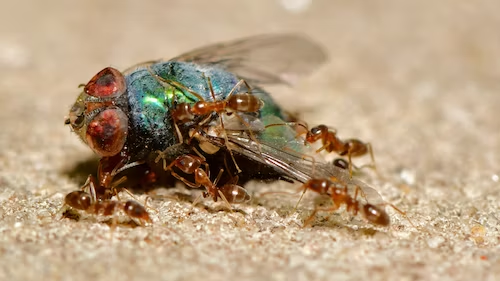Having pests in your home can be a frustrating and stressful experience. Not only can they cause damage to your property, but they can also pose health risks to you and your family. That’s why taking preventative measures is essential to keep your home pest-free. While some people resort to using harmful chemicals to get rid of pests, there are more natural and safe ways to prevent pests from entering your home. In this article, we’ll share some tips from the pros on how to keep your home pest-free without harming the environment or endangering your family’s health.

1. Regularly Check Your Home
It’s essential to check your home for signs of pests regularly. Inspecting your property every few months allows you to identify any potential entry points or problem areas before they become serious issues. The most common pests in Cincinnati homes are mice, ants, and termites. Look for places around your home’s foundation that may be vulnerable to pests, such as cracks in walls or gaps in doors and windows.

Signs of activity, such as gnawed wood, droppings, and muddy trails, may indicate pests in your home. Early detection is key to preventing a full-blown infestation, so pay attention to regular checks.
2. Keep Your Home Clean and Tidy
No one likes a home infested with pests – whether they come from rodents, insects, or other creepy crawlies. To keep these unwanted guests at bay, it’s crucial to maintain a clean and tidy living space. Pests thrive in clutter and mess, so regularly tidying up and removing debris is critical to preventing infestations.
Be sure to mop up any spills or crumbs immediately, perform a thorough vacuum clean around your home, and dispose of your waste safely and appropriately. Creating a clean and hygienic environment can help ensure that your home is not a place pests want to call their own.
3. Seal Cracks and Crevices
Protecting your home from unwanted invaders is essential for any homeowner. Pests are known to make their way into homes through even the smallest of cracks and crevices. These entry points can be noticed but can cause a significant problem if checked. Fortunately, there is a simple solution to this problem.
You can effectively block these uninvited guests from entering your home by sealing up those tiny openings with caulk or weatherstripping. Not only will this prevent an infestation, but it will also give you peace of mind knowing that your home is fully protected against pesky intruders.
4. Store Food Properly
Keeping store-bought food fresh and safely stored is essential to prevent contamination and food waste. When it comes to keeping food fresh, one rule that must be addressed is proper storage. It’s important to keep your food in sealed containers to prevent exposure to air and moisture, which can encourage the growth of bacteria, mold, and pests.
Speaking of pests, they can cause homeowners a significant headache (and health hazard). Ants and rodents are attracted to food left out in the open, but storing food off the floor and in sealed containers can prevent them from getting into your food and home. By properly storing your food, you can ensure that it’ll be safe to consume for as long as possible, minimizing food waste and reducing the risk of foodborne illness.
5. Fix Leaks
Leaky faucets and pipes may seem like minor annoyances, but they can attract unwanted guests into your home – pests. Bugs such as cockroaches, silverfish, and termites are all attracted to moisture and will go out of their way to find a water source. If you have leaks in your home, you provide them with exactly what they need to survive and thrive.
To prevent infestations, it’s crucial to fix leaks as soon as they are discovered. Not only will you reduce the risk of pests taking over your home, but you’ll also save on water bills and prevent potential damage to your property. So, be a responsible homeowner and address any leaks immediately.
6. Keep Your Yard Tidy
A tidy yard not only improves the overall appearance of your home but also plays a crucial role in preventing pests from becoming a problem. Tall grass, piles of leaves, and other yard debris can create a breeding ground for unwanted critters, from mosquitoes to rodents. These pests can quickly enter your home, causing problems from property damage to health concerns.
To avoid this, it’s important to regularly mow your lawn, rake up fallen leaves, and remove any clutter from your yard. Keeping your yard clean and trimmed can significantly reduce the likelihood of pests finding their way into your home.
7. Use Natural Pest Control Methods
Chemicals found in pesticides and insecticides can harm the environment and our health. Thankfully, there are natural methods to control pests that are just as effective without harming ourselves or the planet. Biological pest control can help keep your home free of bugs and other unwanted critters without relying on harsh chemicals or poisons.
One of the most effective ways to prevent pests is by planting certain plants around your home. Lavender and mint can repel insects, while chrysanthemums are known to ward off mosquitoes. You can also use natural ingredients such as garlic or chili powder to create a homemade insect repellent that’s safe for you and the environment.
8. Call a Professional
If you’re struggling to eliminate pests or prevent them from entering your home, it may be time to call the professionals. A pest control company can provide expert advice and services that will help protect your home and family from unwanted guests. They can identify entry points and offer solutions tailored to your needs.
Whether dealing with an existing infestation or trying to prevent one from occurring, a pest control company can help. A professional exterminator can identify what types of pests are in your home and provide the best solutions for getting rid of them. So, if you are overwhelmed by pests, feel free to call the professionals.
And there you have it: eight easy tips on preventing pests from taking over your home. Following these tips, you can keep your home free of pests and ensure you, your family, and your property remain safe. So, don’t let unwanted critters invade your space – take the necessary measures to prevent infestations before they become a problem.




